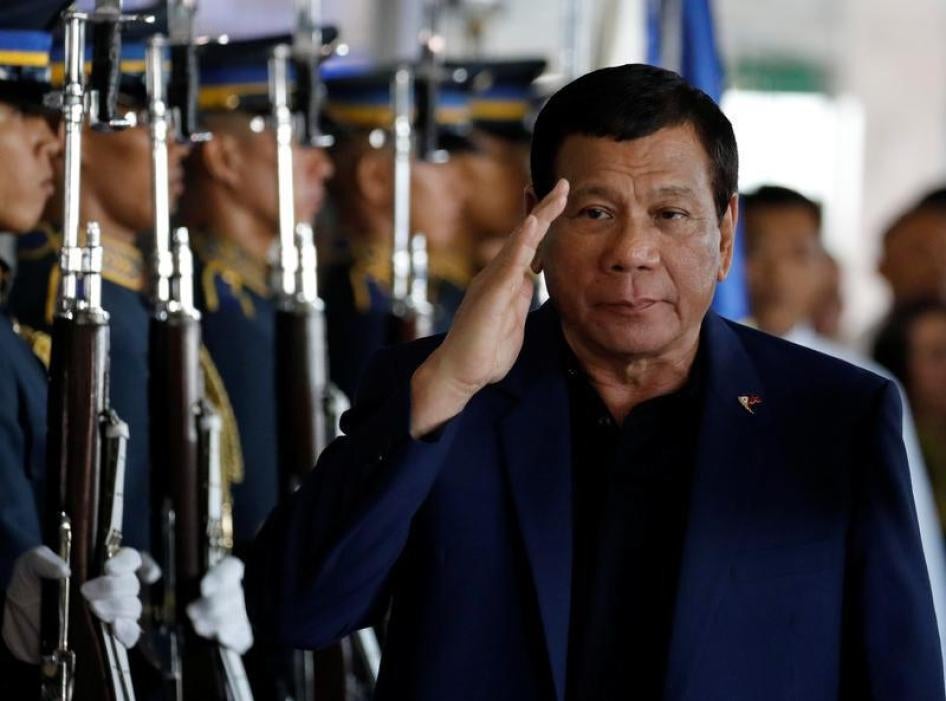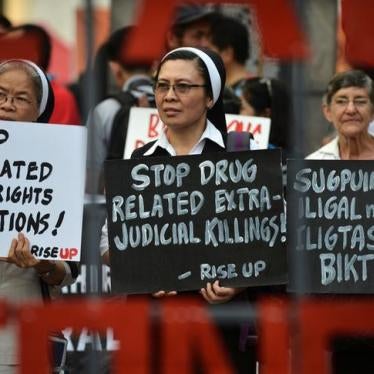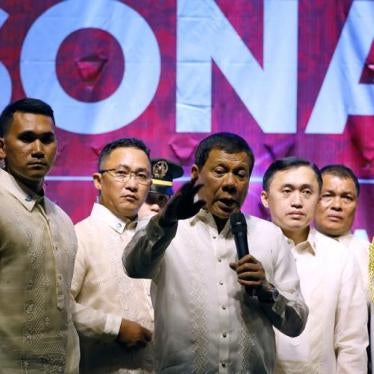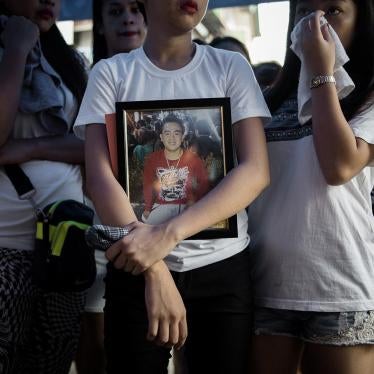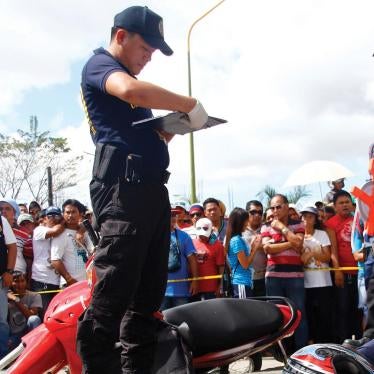Duterte called for police to shoot human-rights activists “who are part of [drug activity]. If they [members of human-rights organizations] are obstructing justice, you shoot them.”
Duterte previously threatened to kill human-rights defenders last December, allegedly for fostering drug use in the country. He followed up that threat a month later by warning that he would extend his anti-drugs campaign to the lawyers of alleged drug users and dealers. His call on police to consider human-rights advocates legitimate drug-war targets is a sinister escalation in his rhetoric and in effect paints a target on the backs of the country’s courageous but beleaguered human-rights community.
These threats are dismaying, but not surprising. Human-rights organizations are just the latest in a growing list of institutions and individuals – including United Nations officials – who have sought accountability for human-rights violations that Duterte has tried to vilify, harass, and intimidate.
Duterte has an interest in derailing any meaningful inquiries into alleged crimes committed by the police and their agents in the “war on drugs” that has claimed the lives of thousands of Filipinos, which he has openly endorsed.
Independent scrutiny of the appalling human calamity of Duterte’s drug war is urgently needed. Human Rights Watch field research has found that government claims that the deaths of suspected drug users and dealers were lawful were blatant falsehoods. The research painted a chilling portrait of mostly impoverished urban-slum dwellers being gunned down in state-sanctioned “death squad” operations that ignore rule-of-law protections.
Interviews with witnesses and victims’ relatives and analysis of police records exposed a pattern of unlawful police conduct designed to paint a veneer of legality over extrajudicial executions that may amount to crimes against humanity. The investigations revealed that police routinely execute drug suspects and then cover up their crimes by planting drugs and guns at the scene.
Efforts to seek accountability for drug-war deaths have gone nowhere, Human Rights Watch says. The Philippine National Police director general, Ronald dela Rosa, has rejected calls for a thorough and impartial investigation of the killings as “legal harassment” and said it “dampens the morale” of police officers. Duterte and some of his key ministers have praised the killings as proof of the “success” of the anti-drug campaign.
During a July 24 press conference, Duterte threatened to block any investigations by the country’s official Commission on Human Rights of alleged abuses by Philippine security forces and stated that the CHR would be “better abolished.”
CHR chairman Chito Gascon has earned Duterte’s enmity by publicly slamming the scale of the “drug war” killings as “unprecedented” and declaring that the death toll had overwhelmed the CHR’s capacity to investigate them adequately. Gascon has also warned that a government failure to stop the killings might prompt an investigation by the International Criminal Court, of which the Philippines is a member.
Duterte publicly backtracked on his threat on August 2 by insisting, as when he supposedly wisecracked about emulating Adolf Hitler in enshrining mass murder as state policy or joshed about the gang rape and murder of an Australian nun, that this too was a “joke.” Too late. The CHR now faces an existential threat from pro-Duterte lawmakers who have taken the president at his word.
During an August 8 budget hearing, House Speaker Pantaleon Alvarez called for the government to cut the CHR’s budget to “zero” and threatened Gascon’s impeachment. Legislator Harry Roque echoed Alvarez’ call and accused the CHR of “being used as a political tool” by Duterte’s opposition.
Duterte and his allies have demonstrated a willingness to neutralize high-profile critics of his “war on drugs.” Exhibit A is the fate of Senator Leila de Lima, former CHR chairwoman and secretary of justice, who has been outspoken against the “drug war.”
In August 2016, de Lima convened hearings of the Senate Committee on Justice and Human Rights, which she chaired, on the anti-drug campaign. The hearings exposed her to a torrent of harassment and intimidation from Duterte and other government officials. Duterte’s allies in the Senate immediately shut down the hearings and stripped de Lima of her leadership of the committee.
On February 24, after a relentless government campaign against her, police arrested de Lima on politically motivated charges – she has remained in detention ever since.
Duterte and his supporters have also sought to intimidate Philippine media outlets for their investigative reporting of state-sanctioned drug-war killings. Targets have included the news channel ABS-CBN as well as the Philippine Daily Inquirer.
In September 2016, the non-governmental National Union of Journalists of the Philippines (NUJP) called for an official inquiry into attacks by pro-Duterte social-media users against freelance journalist Gretchen Malalad and Al Jazeera correspondent Jamela Alindogan. The NUJP justified its demand on the basis that the social-media harassment had “gone beyond legitimate criticism of their professional output to outright threats on their persons.”
Duterte responded by instructing his supporters to stop threatening journalists. But last month he cast aspersions on the integrity of the media platform Rappler.com by alleging – falsely – that it “is fully owned by Americans.”
Duterte has announced that his “war on drugs” will continue until he leaves office in 2022. The attack on human-rights advocates, lawmakers and media outlets that challenge his “drug war” narrative suggests he will also continue to seek to deter, discourage or destroy any moves toward accountability for that carnage.
